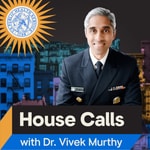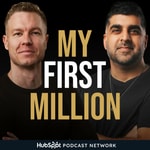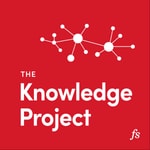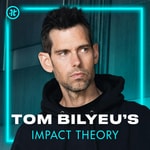House Calls with Dr. Vivek Murthy – Détails, épisodes et analyse
Détails du podcast
Informations techniques et générales issues du flux RSS du podcast.

House Calls with Dr. Vivek Murthy
Office of the U.S. Surgeon General
Fréquence : 1 épisode/13j. Total Éps: 76

Classements récents
Dernières positions dans les classements Apple Podcasts et Spotify.
Apple Podcasts
🇨🇦 Canada - mentalHealth
26/01/2025#97🇺🇸 États-Unis - mentalHealth
20/01/2025#81🇺🇸 États-Unis - mentalHealth
19/01/2025#80🇺🇸 États-Unis - mentalHealth
18/01/2025#99🇺🇸 États-Unis - mentalHealth
10/01/2025#100🇺🇸 États-Unis - mentalHealth
09/01/2025#82🇺🇸 États-Unis - mentalHealth
24/10/2024#96
Spotify
Aucun classement récent disponible
Liens partagés entre épisodes et podcasts
Liens présents dans les descriptions d'épisodes et autres podcasts les utilisant également.
See all- https://www.instagram.com/katecbowler
159 partages
- https://www.instagram.com/drbeckyatgoodinside
140 partages
- https://www.instagram.com/drchatterjee
94 partages
- https://www.getmindset.com/
110 partages
- https://dralizapressman.substack.com/
97 partages
- http://www.surgeongeneral.gov/housecalls
42 partages
- https://www.facebook.com/katecbowler
151 partages
- https://www.facebook.com/MatthewMcConaughey/
19 partages
- https://www.facebook.com/DrChatterjee/
17 partages
Qualité et score du flux RSS
Évaluation technique de la qualité et de la structure du flux RSS.
See allScore global : 58%
Historique des publications
Répartition mensuelle des publications d'épisodes au fil des années.
Best of House Calls: Supporting Parent Mental Health
Épisode 60
mardi 15 octobre 2024 • Durée 25:50
How does parents’ mental health influence their kids’ mental health?
Why are parents today feeling so overwhelmed?
How can parents let go of trying to be the perfect parent?
As the father of two young kids, parenting is a common theme the Surgeon General explores with guests. Given the resonance of the Surgeon General’s recent advisory on parent mental health & well-being, this episode digs into the House Calls archives. We revisit moments with guests including Dr. Lisa Damour and Dr. Aliza Pressman, as they share their expertise—walking through great practical advice about navigating disagreements with children, warning about the impacts of technology, and examining how parents and children share their nervous systems—while also sharing moving personal parenting moments.
(02:47) How are parents feeling these days?
(03:35) Why are parents so often feeling overwhelmed?
(07:00) How does parents’ mental health influence their kids’ mental health?
(09:28) How should parents think about their role in their kids’ mental health?
(12:43) How can men support each other to be more connected fathers?
(18:42) Why should we embrace being an imperfect parent?
(20:58) Why is it helpful to think through goals for parenting?
(22:24) A brief exercise to help us stay focused on what’s most important to us when we’re parenting our children.
We’d love to hear from you! Send us a note at housecalls@hhs.gov with your feedback & ideas. For more episodes, visit www.surgeongeneral.gov/housecalls.
We’d love to hear from you! Send us a note at housecalls@hhs.gov with your feedback & ideas. For more episodes, visit www.surgeongeneral.gov/housecalls.
Kayla Barron: An Astronaut's Guide To Living On Earth
Épisode 58
mardi 1 octobre 2024 • Durée 01:02:49
What can life in space teach us about living well on earth?
As an astronaut, Kayla Barron she has lived this very question. As a member of the NASA’s mission to the International Space Station, she and her crew spent 177 days in orbit. In that time, she performed two space walks. Before becoming an astronaut, she earned a degree in nuclear engineering and served as one of the first female Submarine Warfare Officers in the US Navy. Turns out life on a submarine has a lot in common with life in space.
In this conversation, Kayla shares what it was like to look back on earth from space and the emotions it sparked. She remembers how she kept alive her connection with her family on earth, while she also formed essential, and meaningful relationships with her fellow astronauts on the space station. She opens up about the struggle that came after completing her mission, and the difficulty of finding her footing literally and emotionally. For Kayla, lving in space was a contemplation on what really matters in life.
This conversation was recorded in front of a live audience. Thank you to our friends at NASA for making this conversation possible.
(03:33) Did Kayla Barron always dream of becoming an astronaut?
(08:51) Becoming an astronaut — by applying online
(13:13) What was going through Kayla Barron’s mind during launch?
(16:19) What are those first few hours being in space really like?
(19:29) What perspective about life on earth did being in space give Kayla Barron?
(21:33) If Kayla Barron had to pick just one profound realization from space, what is it?
(23:09) Teamwork in space
(28:20) Readjustment to life on earth
(32:39) Grieving the end of a mission in which she felt the least lonely she had ever felt in her life
(37:33) Did Kaya Barron’s experience in space change how she engaged with people on earth?
(41:12) How her experience in space influences how she parents her child
(45:34) How does Kayla Barron keep herself grounded?
(48:00) Audience Q&A: What are some practical steps Kayla Barron took to address her emotions about returning to life on earth?
(51:02) Audience Q&A: What surprised you most about being in space?
(54:09) Audience Q&A: How did you keep yourself emotionally open to receiving daily feedback from your team?
(58:24) Audience Q&A: Did you ever feel afraid in space?
Send us a note at housecalls@hhs.gov with your feedback & ideas. www.surgeongeneral.gov/housecalls
Kayla Barron, Astronaut
Instagram: @astro_kayla
Facebook: @astrokayla
About Kayla Barron
Kayla Barron was selected by NASA to join the 2017 Astronaut Candidate Class. She reported for duty in August 2017. The Washington native graduated from the U.S. Naval Academy with a bachelor’s degree in Systems Engineering. A Gates Cambridge Scholar, Barron earned a master’s degree in Nuclear Engineering from the University of Cambridge. As a Submarine Warfare Officer, Barron was a member of the first class of women commissioned into the submarine community. She served as member of the NASA SpaceX Crew-3 mission to the International Space Station, which launched on November 10, 2021. NASA’s SpaceX Crew-3 astronauts safely splashed down on Friday, May 6, 2022 completing the agency’s third long-duration commercial crew mission to the International Space Station. The international crew of four spent 177 days in orbit.
Dr. Abraham Verghese (Part 2): On the Healing Power of Writing
Épisode 51
mardi 25 juin 2024 • Durée 36:58
In this part 2 of their conversation, the Surgeon General explores Dr. Abraham Verghese's craft as a writer -- what is his creative process? And what is the relationship between his writing and his work in medicine? The episode closes with Dr. Verghese sharing one of his favorite poems.
(02:56) How does Dr. Verghese deal with moments of fear and uncertainty that arise in practicing medicine?
(04:42) How has Dr. Murthy dealt with uncertainties in practicing medicine?
(08:19) How did Dr. Verghese’s unusual medical training shape who he is as a physician?
(15:18) What gave Dr. Verghese the courage to try writing?
(20:20) What is Dr. Verghese’s creative process for writing?
(22:19) What was it like for Dr. Murthy to write a book?
(26:41) How does Dr. Verghese deal with time pressure and deadlines when writing?
(30:15) Does Dr. Verghese experience writer’s block?
(33:36) A poetic moment with Dr. Verghese
We’d love to hear from you! Send us a note at housecalls@hhs.gov with your feedback & ideas. For more episodes, visit www.surgeongeneral.gov/housecalls.
Dr. Abraham Verghese, Physician and Writer
Instagram: @abraham.verghese.official
About Dr. Abraham Verghese
Dr. Abraham Verghese is a renowned physician, author, and educator, currently serving as the Linda R. Meier and Joan F. Lane Provostial Professor and Vice Chair in the Department of Medicine at the Stanford School of Medicine. He leads the PRESENCE center at Stanford. Dr. Verghese's work sits at the intersections of medical practice, humanism, and narrative, setting a higher bar for patient-centered care. In addition to two memoirs, he is the author of the two acclaimed and bestselling novels, “Cutting for Stone” and “The Covenant of Water.” In 2016, President Obama awarded him the National Humanities Medal; he is also the recipient of numerous honorary degrees. He is an elected member of the Institute of Medicine of the National Academy as well as the American Association of Arts & Sciences. His dedication to patient care and his promotion of bedside medicine creates a meaningful dialogue in the medical field.
Dr. Abraham Verghese (Part 1): When There Is No Cure, How Can We Heal?
Épisode 50
mardi 11 juin 2024 • Durée 45:08
For doctors who spend years training to make their patients better, what happens when there is no cure?
This is how Dr. Abraham Verghese came of age as a physician.
At the height of the AIDS epidemic, he treated a rural population of dying young men, men his own age, who had no future and were often shunned by other doctors. Working with his AIDS patients, Dr. Verghese learned that treating the spirit can bring patients and their families an invaluable part of what they need when facing the incurable. As Dr. Verghese became renowned both as a doctor and a writer, he carried forward his rituals of personal focus on the patient and their families to keep humanity central to his medical practice.
(02:28) Dr. Murthy and Dr. Verghese recount their first meeting
(06:14) How did Abraham learn the difference between curing and healing?
(09:10) What did Abraham come to understand about doctors while caring for AIDS patients in the 1980s?
(13:08) How Dr. Murthy got his start in public health during the AIDS epidemic
(17:22) How can we build a more humanistic approach back into medicine?
(21:20) Do patients feel invisible these days?
(24:21) With the proliferation of electronic medical records, how can medical students learn to connect with patients?
(29:24) How Dr. Murthy learned the importance of the physical exam with patients.
(36:11) When Dr. Verghese sees patients, what are some of the rituals he practices?
(41:12) Was medicine always Dr. Verghese’s calling?
We’d love to hear from you! Send us a note at housecalls@hhs.gov with your feedback & ideas. For more episodes, visit www.surgeongeneral.gov/housecalls.
Dr. Abraham Verghese, Physician and Writer
Instagram: @abraham.verghese.official
About Dr. Abraham Verghese
Dr. Abraham Verghese is a renowned physician, author, and educator, currently serving as the Linda R. Meier and Joan F. Lane Provostial Professor and Vice Chair in the Department of Medicine at the Stanford School of Medicine. He leads the PRESENCE center at Stanford. Dr. Verghese's work sits at the intersections of medical practice, humanism, and narrative, setting a higher bar for patient-centered care. In addition to two memoirs, he is the author of the two acclaimed and bestselling novels, “Cutting for Stone” and “The Covenant of Water.” In 2016, President Obama awarded him the National Humanities Medal; he is also the recipient of numerous honorary degrees. He is an elected member of the Institute of Medicine of the National Academy as well as the American Association of Arts & Sciences. His dedication to patient care and his promotion of bedside medicine creates a meaningful dialogue in the medical field.
Sara Bareilles & Celia Keenan-Bolger: How Do Art and Friendship Set the Stage for Our Mental Health?
Épisode 49
mardi 28 mai 2024 • Durée 01:18:22
In this special episode, Dr. Murthy sits down with Sara Bareilles, Grammy award-winning singer-songwriter and actress, and Celia Keenan-Bolger, Tony award-winning singer and actress. You may know more about them as performers than you do about their experiences with mental health, but this conversation will change that.
As two very good friends who are warm, funny, and genuine, this conversation is an intimate portrait of their friendship and its importance to mental health. Their conversation explores questions many of us have on our minds: How do you prioritize friendship when the world demands us to be so productive? What does it mean to show up for one another? And how do you overcome questions of self-worth and find the courage to speak openly about your mental health?
As you listen, we hope you feel their friendship effect, too. Sara Bareilles closes out the episode with a surprise performance.
This episode was recorded LIVE in New York. Special thanks to the 92NY for hosting.
(03:55) How did Sara Bareilles and Celia Keenan-Bolger meet and become good friends?
(08:33) How can we make friends and have healthy social lives as we get older?
(18:03) Is there a difference between the way men and women make friends in middle age?
(25:54) How do Sara Bareilles and Celia Keenan-Bolger create the space for friendship in a world that’s always asking them to be more productive?
(33:24) How do Sara Bareilles and Celia Keenan-Bolger balance online activity with real-world friendships?
(44:02) Where did Sara Bareilles and Celia Keenan-Bolger find the courage and clarity to speak openly about their mental health?
(52:41) How have Sara Bareilles and Celia Keenan-Bolger dealt with feelings about lack of self-worth when they arise?
(01:02:19) What are some of Dr. Murthy’s and his guests’ favorite lyrics?
(01:12:52) A special performance by Sara Bareilles
We’d love to hear from you! Send us a note at housecalls@hhs.gov with your feedback & ideas. For more episodes, visit www.surgeongeneral.gov/housecalls.
Sara Bareilles, Singer-Songwriter & Actress
Instagram: @sarabareilles
Facebook: @sarabareilles
Celia Keenan-Bolger, Actress & Singer
Instagram: @celiakb
About Sara Bareilles and Celia Keenan-Bolger
Sara Bareilles has received three Tony® Award nominations, most recently in 2023 for her performance as ‘The Baker’s Wife’ in Stephen Sondheim and James Lapine’s Into the Woods – three Primetime Emmy® Award nominations and nine GRAMMY® Award nominations. On Broadway, she composed music and lyrics for Waitress, and stepped into the lead role both on Broadway and in the West End. Most recently, she starred in the filmed live-capture of Waitress: The Musical, which ran for two weeks in theatres nationwide in December 2023. Her other musical theater credits include a song on the Tony Award-nominated score for SpongeBob SquarePants and Emmy Award-nominated appearance as Mary Magdalene in NBC's “Jesus Christ Superstar Live.” Bareilles produced original music and executive-produced the musical drama series “Little Voice,” teaming up with Jessie Nelson, J.J. Abrams and Apple. She also plays Dawn Solano on the Emmy-nominated musical comedy series “Girls5eva”, the third season of which premieres in March 2024 on Netflix.
Celia Keenan-Bolger is an actress and singer. She won the Tony Award for Best Featured Actress in a Play for portraying Scout Finch in To Kill a Mockingbird (2018). She has also been Tony-nominated for her roles in The 25th Annual Putnam County Spelling Bee (2005), Peter and the Starcatcher (2012), The Glass Menagerie (2014), and her most recent role in Mother Play (2024). Other credits - Broadway: The Cherry Orchard, Les Misérables. Off-Broadway: The Oldest Boy, Merrily We Roll Along, A Small Fire. Select Film/TV: “The Gilded Age,” “Bull,” “Louie,” “The Good Wife,” “Nurse Jackie,” “Good Behavior,” “Elementary". Tony Award, Outer Critics Circle, three Drama Desk Award wins.
Dr. Aliza Pressman: Why Parent Mental Health is Essential for Our Kids
Épisode 48
mardi 14 mai 2024 • Durée 01:11:53
As a parent, have you ever worried about whether you’re doing a good enough job? Do you feel the pressure to be perfect? Have you felt drained by the demands of parenting?
In this deeply personal conversation, the Surgeon General (and dad of 2) and psychologist Dr. Aliza Pressman put the spotlight on parent mental health. Dr. Pressman changes the conversation from trying to be the perfect parent to growing as a parent. To help our kids’ mental health, we also need to prioritize and care for parent mental health.
Drawing from her research, Dr. Pressman offers reassuring approaches to help parents find self-compassion and stay regulated so kids can better regulate themselves. She also shares how to turn moments when things go wrong into moments for repair and growth in parent-child relationships.
The conversation ends with a parenting Q&A, hosted by Dr. Murthy and surprise Q&A co-host Kate Bowler!
(04:00) What challenges does Aliza Pressman see parents facing today?
(05:00) Why can it feel difficult to talk about the joys of parenting?
(07:55) What’s the upside of being an imperfect parent?
(10:15) How does parent mental health influence kids?
(12:49) What does Dr. Murthy see in his own parents parenting journey?
(18:55) What is self-regulation and how do we cultivate it?
(30:47) Why do parents feel exhausted and drained these days?
(34:21) Can we get clear on the goal of parenting?
(43:44) How does Aliza handle the flow of news and information to herself and her kids?
(50:38) What are 5 ways to help children become resilient people?
(57:30) Parenting Q&A with the Surgeon General & Kate Bowler
We’d love to hear from you! Send us a note at housecalls@hhs.gov with your feedback & ideas. For more episodes, visit www.surgeongeneral.gov/housecalls.
Dr. Aliza Pressman, Psychologist & Author
Instagram: @raisinggoodhumanspodcast
Facebook: @raisinggoodhumanspodcast
Substack: @dralizapressman
About Dr. Aliza Pressman Dr. Aliza Pressman is a developmental psychologist with two decades experience working with families. She is the author of the New York Times bestselling book, “The 5 Principles of Parenting: Your Essential Guide to Raising Good Humans,” and the host of the popular podcast “Raising Good Humans”. Aliza is the co-founding director of The Mount Sinai Parenting Center and is an assistant clinical professor at Mount Sinai Hospital. She holds degrees from Dartmouth College, Teacher's College, and Columbia University. Aliza is the mother of two teenagers.
Shankar Vedantam: How Do Our Minds Help (or Hinder) Finding Connection & Purpose? (Part 2)
Épisode 47
mercredi 1 mai 2024 • Durée 40:36
What is our purpose, both individually and collectively? What lies in the balance of who we are now and who we will become?
In Part Two of this episode, the Surgeon General and Shankar Vedantam, host of “Hidden Brain,” go deep into conversation about our individual and national quest for meaning and purpose.
This episode becomes deeply personal as both host and guest reveal their family’s hopes for coming to America, and the unimaginable ways in which those dreams were realized. They find themselves asking where else on earth has what America can offer? And how can we remember and reinforce our ideals at moments the noise becomes too great?
(03:23) How can we encourage young people to dream about the future?
(09:21) How can we bring freshness and curiosity to our daily lives?
(11:57) What does it mean to be a tourist in our own lives?
(15:28) What is the power of having purpose in our lives?
(22:39) What’s the difference between goals and purpose?
(25:39) How would Dr. Murthy bolster America’s sense of purpose?
(28:58) What is the enormous possibility that the United States offers?
(30:16) What story of America did Dr. Murthy see in the crowd at his swearing in ceremony?
(32:51) Who are Shankar Vedantam’s Unsung Heroes?
We’d love to hear from you! Send us a note at housecalls@hhs.gov with your feedback & ideas. For more episodes, visit www.surgeongeneral.gov/housecalls.
Shankar Vedantam, Host, “Hidden Brain” Podcast
Instagram: @hiddenbrain
X: @hiddenbrain
Facebook: @hiddenbrain
About Shankar Vedantam
Shankar Vedantam is the host and executive editor of the Hidden Brain podcast and radio show. Shankar and NPR launched the podcast in 2015, and it now receives millions of downloads per week, and is regularly listed as one of the top 20 podcasts in the world. The radio show, which debuted in 2017, is heard on more than 425 public radio stations across the United States.
Vedantam was NPR’s social science correspondent between 2011 and 2020, and he spent 10 years as a reporter at The Washington Post. From 2007 to 2009, he was also a columnist, and wrote the Department of Human Behavior column for the Post.
Vedantam and Hidden Brain have been recognized with numerous journalism awards, including the Edward R Murrow Award, and honors from the American Association for the Advancement of Science, the Society for Personality and Social Psychology, the International Society of Political Psychology, the Society of Professional Journalists, the National Association of Black Journalists, the Austen Riggs Center, the American Psychoanalytic Association, the Webby Awards, the Pennsylvania Associated Press Managing Editors, the South Asian Journalists Association, the Asian American Journalists Association, the Pennsylvania Newspaper Association, the American Public Health Association, the Templeton-Cambridge Fellowship on Science and Religion, and the Rosalynn Carter Mental Health Journalism Fellowship.
In 2009-2010, Vedantam served as a fellow at the Nieman Foundation for Journalism at Harvard University.
Shankar Vedantam speaks internationally about how the “hidden brain” shapes our world and is the author of two non-fiction books: The Hidden Brain: How our Unconscious Minds Elect Presidents, Control Markets, Wage Wars and Save Our Lives, published in 2010, and Useful Delusions: The Power and Paradox of the Self-Deceiving Brain published in 2021, an exploration of deception’s role in human success.
Shankar Vedantam: How Do Our Minds Help (or Hinder) Finding Connection & Purpose? (Part 1)
Épisode 46
mardi 16 avril 2024 • Durée 45:10
Have you ever had a moment when you’ve wanted to reach out to someone you haven’t seen in awhile, but something stops you, like the worry you’ll say the wrong thing? Or have you had the experience of assuming that someone who disagrees with you must also dislike you?
It turns out, our mind can play tricks on us that make it harder to connect.
Shankar Vedantam, host and creator of the podcast ”Hidden Brain” joins the Surgeon General for a two-part conversation that travels across science and deeper philosophical questions about life.
In this first conversation, Shankar explains the “hidden brain,” the part of the mind that function outside of our awareness, making unconscious decisions and judgments. They ponder the paradox of how social anxieties keep us from connecting, but how acts of connection and kindness have far greater impact and power than most of us realize.
Offering both science and personal stories, Shankar and Dr. Murthy help us work through our fears of connecting. And help us close the gap between our values, like kindness, and our actions.
(04:04) How does Shankar Vedantam describe the origins of the Hidden Brain podcast?
(06:18) How can we understand if our hidden brain is helping us?
(08:34) How does our hidden brain keep us from connecting with other people?
(14:04) What does it mean to express gratitude to someone else?
(18:39) How has Dr. Murthy cultivated his sense of kind and warmth?
(24:20) How can we tell a better story about the nature of our humanity?
(29:36) How did Shankar Vedantam become a translator of science?
(33:12) How do listeners respond to the Hidden Brain podcast?
(36:12) How are ideas for Hidden Brain podcast episodes developed?
We’d love to hear from you! Send us a note at housecalls@hhs.gov with your feedback & ideas. For more episodes, visit www.surgeongeneral.gov/housecalls.
Shankar Vedantam, Host, “Hidden Brain” Podcast
Instagram: @hiddenbrain
X: @hiddenbrain
Facebook: @hiddenbrain
About Shankar Vedantam
Shankar Vedantam is the host and executive editor of the Hidden Brain podcast and radio show. Shankar and NPR launched the podcast in 2015, and it now receives millions of downloads per week, and is regularly listed as one of the top 20 podcasts in the world. The radio show, which debuted in 2017, is heard on more than 425 public radio stations across the United States.
Vedantam was NPR’s social science correspondent between 2011 and 2020, and he spent 10 years as a reporter at The Washington Post. From 2007 to 2009, he was also a columnist, and wrote the Department of Human Behavior column for the Post.
Vedantam and Hidden Brain have been recognized with numerous journalism awards, including the Edward R Murrow Award, and honors from the American Association for the Advancement of Science, the Society for Personality and Social Psychology, the International Society of Political Psychology, the Society of Professional Journalists, the National Association of Black Journalists, the Austen Riggs Center, the American Psychoanalytic Association, the Webby Awards, the Pennsylvania Associated Press Managing Editors, the South Asian Journalists Association, the Asian American Journalists Association, the Pennsylvania Newspaper Association, the American Public Health Association, the Templeton-Cambridge Fellowship on Science and Religion, and the Rosalynn Carter Mental Health Journalism Fellowship.
In 2009-2010, Vedantam served as a fellow at the Nieman Foundation for Journalism at Harvard University.
Shankar Vedantam speaks internationally about how the “hidden brain” shapes our world and is the author of two non-fiction books: The Hidden Brain: How our Unconscious Minds Elect Presidents, Control Markets, Wage Wars and Save Our Lives, published in 2010, and Useful Delusions: The Power and Paradox of the Self-Deceiving Brain published in 2021, an exploration of deception’s role in human success.
Rebecca Solnit: Why Is Hope So Powerful?
Épisode 45
mardi 2 avril 2024 • Durée 52:33
What is hope and why is it so powerful?
For writer Rebecca Solnit, hope is a commitment to possibility in the face of uncertainty. While many of us react to the unknown with anxiety or worry, Rebecca sees the opposite: that inherent to unpredictable circumstances is the possibility people can take action and to come together to create change.
In this conversation, Rebecca Solnit and the Surgeon General discuss why hope is necessary. They look back at communities formed in response to disasters, like 9/11 and hurricanes, and how hope and connection are inextricably linked. A historian, Solnit points to milestones like the fall of the Berlin Wall in which people’s actions, sometimes incremental, led to unforeseen outcomes.
In facing the massive uncertainty of climate change, Solnit offers why she is hopeful. Rather than fall to despair, she points that humans, throughout history, have seen the possibility to intervene and take action. And THAT is what Solnit calls hope.
(04:34) Why can disasters be so powerful for uniting communities?
(11:16) Why do some types of disasters bring people more together than others?
(16:55) How do you advise young people who feel despair about climate change?
(27:21) How can the way we remember history’s great social changes contribute to hope or hopelessness?
(31:28) How does social media contribute to loneliness and isolation?
(37:45) Has tech convinced us that living efficiently is more important than living in person?
(47:33) How does Rebecca Solnit make herself feel better when she gets down?
(48:35) What does the Surgeon General do to feel better when he is down?
We’d love to hear from you! Send us a note at housecalls@hhs.gov with your feedback & ideas. For more episodes, visit www.surgeongeneral.gov/housecalls.
Rebecca Solnit, Writer
About Rebecca Solnit
Writer, historian, and activist Rebecca Solnit is the author of twenty-five books on feminism, environmental and urban history, popular power, social change and insurrection, wandering and walking, hope and catastrophe. She co-edited the 2023 anthology “Not Too Late: Changing the Climate Story from Despair to Possibility”. Her other books include “Orwell’s Roses”; “Recollections of My Nonexistence”; “Hope in the Dark”; “Men Explain Things to Me”; “A Paradise Built in Hell: The Extraordinary Communities that Arise in Disaster”; and “A Field Guide to Getting Lost”. A product of the California public education system from kindergarten to graduate school, she writes regularly for the Guardian, serves on the board of the climate group Oil Change International, and in 2022 launched the climate project Not Too Late (nottoolateclimate.com).
Encore | Kate Bowler: Learning to Live When Life Falls Apart
Épisode 44
mardi 19 mars 2024 • Durée 42:54
What lessons does life’s uncertainties offer? Kate Bowler’s stage IV cancer diagnosis ushered her into a world of fear and pain. Living in 60-day increments, her future held no promises. Angry about losing the life she had created, the love of family, friends, and her faith community helped Kate forge a new type of strength—learning to lean on others. This conversation between the nation’s doctor and Kate Bowler illuminates how we find truth and beauty within the uncertainties of life.
(05:07) How did Kate Bowler’s cancer diagnosis at age 35 affect her life?
(09:32) Where did Kate Bowler navigate the uncertainty of her illness?
(12:02) How did Kate Bowler re-define strength?
(14:26) How did Kate Bowler’s community support her during her most acute phase of illness?
(17:23) How can other families build a village for their children?
(20:27) How has Kate Bowler’s health precarity changed how she thinks about life?
(25:56) How can we encourage our kids to strive in a healthy way?
(29:38) What is the message of Kate Bowler’s most recent book?
(31:37) When Kate Bowler was ill, how did others seem to expect her to fix her life?
(34:43) How did Kate Bowler’s experience with cancer impact her faith?
(39:15) When is the last time Kate Bowler laughed uncontrollably?
(40:49) Kate Bowler closes with a blessing.
We’d love to hear from you! Send us a note at housecalls@hhs.gov with your feedback & ideas. For more episodes, visit www.surgeongeneral.gov/housecalls.
Kate Bowler, Writer & Professor
Instagram: @katecbowler
X: @katecbowler
Facebook: @katecbowler
About Kate Bowler
Kate Bowler, Ph.D. is a 4x New York Times bestselling author, award-winning podcast host, and professor at Duke University. She studies the cultural stories we tell ourselves about success, suffering, and whether (or not) we’re capable of change. She wrote the first and only history of the American prosperity gospel—the belief that God wants to give you health, wealth, and happiness—before being unexpectedly diagnosed with stage IV cancer at age 35. While she was in treatment and not expected to survive, she wrote two New York Times bestselling memoirs, Everything Happens for a Reason (and Other Lies I’ve Loved) and No Cure For Being Human (and Other Truths I Need to Hear). After years of being told she was incurable, she was declared cancer-free. But she was forever changed by what she discovered: life is so beautiful and life is so hard. For everyone.
Kate is determined to create a gentler world for everyone who wants to admit that they are not “living their best life.” She hosts the Everything Happens podcast where, in warm, insightful, often funny conversations, she talks with people like Malcolm Gladwell, Tig Notaro, and Archbishop Justin Welby about what they’ve learned in difficult times. Author of seven books including Good Enough, The Lives We Actually Have, and her latest, Have a Beautiful, Terrible Day!, she lives in Durham, North Carolina, with her family and continues to teach do-gooders at Duke Divinity School.









